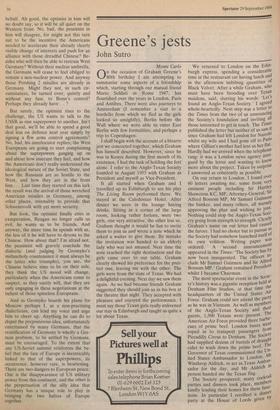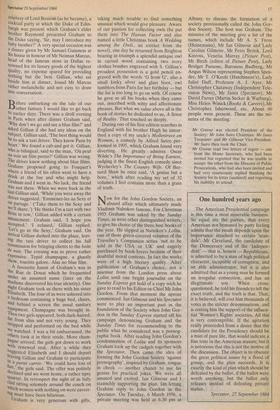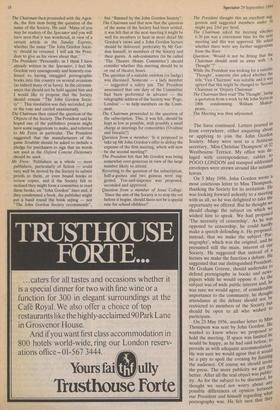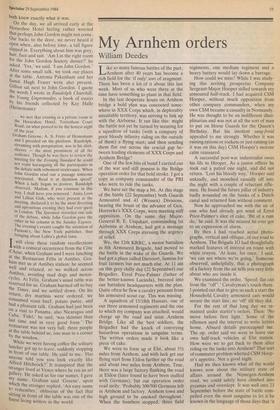Greene's jests
John Sutro
Monte Carlo
On the occasion of Graham Greene's 80th birthday I am attempting to summarise some aspects of a friendship which, starting through our mutual friend Mario Soldati in Rome 1947, has flourished over the years in London, Paris and Antibes. There were also journeys to Amsterdam (I remember a visit to a bordello from which we fled as the girls looked so unsightly), Berlin before the Wall where we were able to enter East Berlin with few formalities, and perhaps a trip to Copenhagen.
I shall begin with the account of a bizarre jest we concocted together, which Graham has himself described. However, since he was in Kenya during the first month of its existence, I had the task of holding the fort alone. I refer to the Anglo-Texan Society founded in August 1953 with Graham as President and myself as Vice-President.
It all started when Graham and I travelled up to Edinburgh to see his play The Living Room performed there. We stayed at the Caledonian Hotel. After dinner we were in the lounge having drinks. Sitting in a corner of the large room, looking rather forlorn, were two girls, one very attractive, the other less so. Graham thought it would be fun to invite them to join us and wrote a note which he asked a waiter to give them. By mistake the invitation was handed to an elderly lady who was not amused. Next time the note reached the right destination and the girls came over to our table. Graham clearly showed his preference for the pret- tier one, leaving me with the other. The girls were from the state of Texas. We had a delightful evening. Next day we saw them again. As we had become friends Graham suggested they should join us in his box at the theatre that night. They accepted with pleasure and enjoyed the performance. I must say those Texan girls really enlivened our stay in Edinburgh and taught us quite a lot about Texas.
We returned to London on the Edin- burgh express, spending a considerable time in the restaurant car having lunch and in the afternoon imbibing quantities of Black Velvet. After a while Graham, who must have been brooding over Texan maidens, said, slurring his words: 'Let's found an Anglo-Texan Society.' I agreed whole-heartedly. Next step was a letter to the Times from the two of us announcing the Society's foundation and inviting all those interested to get in touch. The Times published the letter but neither of us saw it since Graham had left London for Nairobi whilst my wife and I had gone off to Pads where Gillian's mother had lent us her flat. Hardly had we arrived when the telephone rang: it was a London news agency
intri gued by the letter and wanting to know more about the project. Taken by surprise I answered as coherently as possible. On our return to London, I found over
60 letters awaiting me, some from veryeminent people including Sir Hartley Shawcross KC, MP, Attorney-General, Sir Alfred Bossom MP, Mr Samuel Guinness the hanker, and many others, all warmlY approving the plan and wishing to join. Nothing could stop the Anglo-Texan Soci- ety going from strength to strength. Clearly Graham's name on our letter had caused the furore. I had no choice but to pursue as the Society had somehow launched itself of its own volition. Writing paper was ordered. A second announcement appeared in the Times: 'The Society has by now been inaugurated. The officers in- clude Mr Samuel Guinness and Sir Alfred Bossom MP.' Graham remained President whilst I became Chairman. The most spectacular event in the Socie- ty's history was a gigantic reception held at Denham Film Studios, at that time the headquarters of the United States Air Force. Graham could not attend the party as he was in Vietnam. As well as members of the Anglo-Texan Society • and the guests, 1,500 Texans were present. The American Air Force provided three barbe- cues of prime beef. London buses were roped in to transport passengers from Piccadilly Circus to Denham. The Society had supplied dozens of barrels of draught cider to wash down the prime- beef. The Governor of Texas commissioned the Un- ited States Ambassador to London, Mr Winthrop Aldrich, to act as Texas Ambas- sador for the day, and Mr Aldrich in person handed me the Texan flag. The Society prospered; many cocktail parties and dinners took place, members kindly lending their homes for these func- tions. In particular I recollect a dinner party at the House of Lords given by
courtesy of Lord Bossom (as he became), a cOcktair party at which the Duke of Edin- burgh was present which Graham's elder brother Raymond presented Graham to the Duke saying, 'Sir, may I introduce my baby brother?' A very special occasion was a dinner given by Mr Samuel Guinness at his house in honour of Mr Neiman Marcus, head of the famous store in Dallas re- nowned for its luxury goods of the highest quality, no expense spared for providing nothing but the best. Gillian, who sat beside him at dinner, found Mr Marcus rather melancholic and not easy to draw into conversation.
Before embarking on the tale of our other fantasy I would like to go back to earlier days. There was a droll evening in Paris when after dinner Graham said, Why don't we go and see a blue film?' and asked Gillian if she had any ideas on the subject. Gillian said, 'The best thing would be to ask a taxi driver. They know Paris by heart.' We found a cab and got it. Gillian, who is bilingual, said to the man, 'oil pent on voir un film porno?' Gillian was wrong. The driver knew nothing about blue films. Graham proposed going to Fouquet's where a friend of his often went to have a drink at the bar and who might help. Graham and I went in. No luck, the friend was not there. When we were back in the taxi Gillian said, 'While you were away the driver suggested, 'Emmenez-les au Sexy et partage.' (`Take them to the Sexy and share.') 'He thinks I'm a tart with two Brits in tow,' Gillian added with a certain amusement. Graham said, 'I hope you accepted.' I refused,' Gillian replied. Let's go to the Sexy,' Graham said. On arrival Gillian dashed into the place, leav- ing the taxi driver to collect his full Commission for bringing clients to the boite de nuit. The evening was to prove rather expensive. Tepid champagne, a ghastly show, tourists galore. Alas no blue film. A favourite haunt of Graham's was in the Rue de Douai which he frequented under an assumed name (later on the madame discovered his true identity). One night Graham took us there with his sister Elisabeth. The four of us were ushered into a bedroom containing a huge bed, chairs, and behind a screen the usual sanitary equipment. Champagne was brought in. Then two girls appeared, both dark-haired,
far from slim and not very young. They stripped and performed on the bed while we watched. I was a bit embarrassed, the others took it in their stride. More cham- pagne arrived; the girls got down to work with renewed zeal. After a while they
suggested Elisabeth and I should depart leaving Gillian and Graham to participate In a partie carree. 'We could have lots of
fun,' the girls said. The offer was politely declined and we went home, a rather tipsy quartet. In retrospect the sight of us fully
clad sitting solemnly around the couch on Which women with nothing on were cavort- ing must have been hilarious.
Graham is very generous with gifts,
taking much trouble to find something unusual which would give pleasure. Aware of our passion for collecting owls (he put them into The Human Factor and also named a little Christmas book A Wedding among the Owls, an extract from the novel), one day he returned from Brighton bearing in triumph a splendid antique owl in carved wood containing two ivory clothes brushes engraved with S. Gillian's proudest possession is a gold pencil en- graved with the words `G from G', also a small kinky silver and glass boot, owl tumblers from Paris for her birthday — but the list is too long to go on with. Of course he gave us all his books when they came out, inscribed with witty and affectionate phrases. But what we value above all is the book of stories he dedicated to us, A Sense of Reality. That touched us deeply.
During one of his first edition searches in England with his brother Hugh he unear- thed a copy of my uncle's Mollentrave on Women, a comedy by Alfred Sutro per- formed in 1905, which Graham found very diverting. He greatly admires Oscar Wilde's The Importance of Being Earnest, judging it the finest English comedy since Wycherley's The Country Wife. Of Ber- nard Shaw he once said, 'A genius but a bore,' which after reading my set of 32 volumes I feel contains more than a grain of truth.
Now for the John Gordon Society, an absurd affair which ultimately made Vladimir Nabokov famous. For Christmas 1955 Graham was asked by the Sunday Times, as were other distinguished writers, to give his choice of the three best books of the year. He slipped in Nabokov's Lolita, one of those green-covered volumes of the Traveller's Companion series 'not to be sold in the USA or UK' and eagerly purchased by book-lovers because of their doubtful moral contents. In fact the works were of a high literary quality. After publication of Graham's choice, not a murmur from the London press about Lolita until one bright journalist on the Sunday Express got hold of a copy wich he gave to read to his Editor-in-Chief Mr John Gordon. From that moment the uproar commenced. Ian Gilmour and his Spectator were to play an important part in the foundation of the Society when John Gor- don in the Sunday Express started off his campaign denouncing Graham and the Sunday Times for recommending to the public what he considered was a pornog- raphic book. After reading John Gordon's condemnation of Lolita and its sponsors Graham took up the cudgels together with the Spectator. Then came the idea of forming the John Gordon Society 'against pornography', inspired by Graham, tongue in cheek — another chance to use his genius for practical jokes. We were all amused and excited, Ian Gilmour and I staunchly supporting the plan, Ian letting Graham reply to John Gordon in the Spectator. On Tuesday, 6 March 1956, a private meeting was held at 6.30 pm at Albany to discuss the formation of a society provisionally called the John Gor- don Society. The host was Graham. The minutes of the meeting give a list of the names, which include Mr A. S. Frere (Heinemann), Mr Ian Gilmour and Lady Caroline Gilmour, Mr Peter Brook, Lord Kinross, Venetia Murray (Picture Post), Mr Birch (editor of Picture Post), Lady Bridget Parsons, Baroness Budberg, Mr Angus Wilson representing Stephen Spen- der, Mr T. O'Keefe (Hutchinson's), Lady Juliet Duff, Professor A. J. Ayer, Mr Christopher Chataway (Independent Tele- vision News), Mr Janes (Spectator), Mr David Farrer (Martin Secker & Warburg), Miss Helen Winick (Books & Careers),Mr Christopher Isherwood, etc. About 60 people were present. These are the mi- nutes of the meeting:
Mr Greene was elected President of the Society: Mr John Sutro Chairman: Mr Janes Treasurer: and Mr Gilmour Vice-President. Mr Sutro then took the Chair.
Mr Greene read two letters of regret — one from the Home Secretary, who had been invited but regretted that he was unable to accept: the other "from the Director of Public Prosecutions, who had also been invited and had very courteously replied thanking the Society for its letter (undated) and regretting his inability to attend.
The Chairman then proceeded with the Agen- da, the first item being the question of the name of the Society. He said: 'Many of you may be readers of the Spectator and you will have seen that it was wondered, in view of a certain article in the Sunday Express, whether the name 'The John Gordon Socie- ty' should be retained. I will ask the Presi- dent to give us his views about that.'
The President: 'Personally, as I think I have already written in the Spectator, I feel Mr Gordon very courageously and honestly con- fessed to having smuggled pornographic books into this country on several occasions (as indeed many of us have). In the circumst- ances this should not be held against him and I would like to propose that the Society should remain "The John Gordon Socie- ty" '. This resolution was duly seconded, put to the vote and carried unanimously.
The Chairman then raised the question of the Objects of the Society. The President said he hoped one of the publishers present might have some suggestions to make, and referred to Mr Frere in particular. The President suggested that the manufacturers of the game Scrabble should be asked to include a pledge for purchasers to sign that no words not used in the Oxford Concise Dictionary should be used.
Mr Frere: 'Publishers as a whole — most publishers, particularly of fiction — could very well be invited by the Society to submit proofs to them, or even bound books or review copies, and if the Society felt so inclined they might form a committee to read these books, on "John Gordon" lines and, if they condemned a book, the publisher might put a band round the book saying — not "The John Gordon Society recommends", but "Banned by the John Gordon Society". The Chairman said that now that the question of the name of the Society had been settled, it was felt that at the next meeting it might be well for members to hear in more detail Mr Gordon's views and a John Gordon lecture should be delivered, preferably by Mr Gor- don himself, to members of the Society and their guests. A sub-committee (to be called 'The Theatre Hours Committee') should consider whether this meeting should be in or out of theatre hours.
The question of a suitable emblem (or badge) was discussed. Someone — a lady member — suggested a safety pin. The President announced that one duty of the Committee had been performed in advance — the telegraphic address of the Society was 'Pogo, London' — to help members on the Conti- nent.
The Chairman proceeded to the question of the subscription. This, it was felt, should be kept as low as possible, with possibly a small charge at meetings for comestibles (Ovaltine and biscuits?).
Question from a member: 'Is it proposed to take up Mr John Gordon's offer to defray the expense of the first meeting, which will now be the second meeting?'
The President felt that Mr Gordon was being somewhat over-generous in view of the large number likely to attend.
Reverting to the question of the subscription, half-a-guinea and two guineas were sug- gested. Ten-and-sixpence was proposed, seconded and approved.
Question from a member of Jesus College: 'Since the aim of the Society is to stop the rot before it begins, should there not be a special rate for school-children?'
The President thought this an excellent sug- gestion and suggested members under 16 might pay 2/6d per head. The Chairman asked the meeting whether
6.30 pm was a convenient time for the next meeting and this was approved. He asked whether there were any further suggestions from the floor.
Question: 'Would it not be fitting that the Chairman should send us away with "A Thought"?'
While the President was looking for a suitable 'Thought', someone else asked whether the title Nice-Chairman' was suitable and it was agreed that this might be changed to 'Second Chairman or 'Deputy Chairman'.
The Chairman then read 'The Thought', being a quotation from a work by Mr John Styles in 1806 condemning William Shakes-
peare The Meeting was then adjourned.
The farce continued. Letters poured in from everywhere, either enquiring about or applying to join the John Gordon Society. Many were sent to a fictitious secretary, 'Miss Christine Thompson' at 32 Westbourne Terrace. My office was de- luged with correspondence, cables to POGO LONDON and stamped addressed envelopes were strewn around like autumn leaves.
On 5 May 1956, John Gordon wrote a most courteous letter to Miss Thompson, thanking the Society for its invitation. He was looking forward ardently to a meeting with us all, so he was delighted to take the opportunity we offered. But he thought we should change the subject on which we wished him to speak. We had proposed `The necessity of censorship'. As he was opposed to censorship, he could hardly make a speech defending it. He proposed, instead, that we make the subject 'Por- nography', which was the original, and he presumed still the main, interest of our Society. He suggested that instead of a lecture we make the function a debate. He suggested that our distinguished President, Mr Graham Greene, should undertake to defend pornography in books and news- papers while he would oppose it. As the subject was of wide public interest and, he was sure we would agree, of considerable importance to the community, he thought attendance at the debate should not be restricted to members of the Society but should be open to all who wished to participate. On 23 May 1956, another letter to Miss Thompson was sent by John Gordon. He wanted to know where we proposed to hold the meeting. If space was limited he would be happy, as he had said before, to provide us with adequate accommodation: He was sure we would agree that it would be a pity to spoil the evening by limiting the audience. Of course we should invite the press. The more publicity we got the better. After all the real object was public ity. As for the subject to be discussed, he thought we need not worry about any possible differences of opinion between t our President and himself regarding wha pornography was. He felt sure that theY
both knew exactly what it was.
On the day, we all arrived early at the Horseshoe Hotel feeling rather worried that perhaps John Gordon might not come. Our backs to the door, we never heard it open when, also before time, a tall figure slipped in. Everything about him was grey, hair, face and suit. 'Am I in the right room for the John Gordon Society dinner?' he asked. 'Yes,' we said. 'I am John Gordon.' After some small talk, we took our places at the table. Antonia Pakenham and her fiancé Hugh Fraser were also present. Gillian sat next to John Gordon. I quote the words I wrote in Randolph Churchill, the Young Unpretender, a book of essays by his friends collected by Kay Halle (Heinemann): • • . we met that evening in a private room in the Horseshoe Hotel, Tottenham Court Road, on what proved to he the hottest night of the year. Graham Greene, A. S. Frerc of Heinemann and I presided on the platform. Randolph, streaming with perspiration, was in his shirt- sleeves — the most prominent of all the audience. Though he was there to review the meeting for the Evening Standard he could not resist haranguing all the participants in the debate with vehement irrelevance. When John Gordon read out a passage someone interjected, 'Read it at dictation speed!' When a lady began to protest, Randolph observed, 'Madam, if you continue in this way, I shall have you removed.' Anita Loos and Lillian Gish, who were present at the meeting, declared it to be the most diverting and uproarious evening they had ever spent in London. The Spectator recorded one side of the debate, while John Gordon gave the other in his column in the Sunday Express. The evening's events caught the attention of Putnam's, the New York publisher, thus bringing about Lolita's global fame. Iwill close these random recollections with a comical occurrence from the Ceite d Azur, when Graham and I were lunching at the Restaurant Felix in Antibes. Gra- ham met us at Antibes station; he seemed well and relaxed, so we walked across Antibes, avoiding mad dogs and motor- cycles. At Felix, Graham's usual table was reserved for us. Graham hurried off to buy the Times, and we settled down. On his return, dry martinis were ordered, we consumed roast beef, potato puree, and had a pleasant talk. Graham had just been on a visit to Panama, also Nicaragua and Cuba. 'Fidel,' he said, 'was skinnier than last time and in very good form.' The restaurant was not very full: three people at the table behind us, one man in a corner by the window.
While we were having coffee the solitary luncher got up to leave, suddenly stopping in front of our table. He said to me, 'Has anyone told you you look exactly like Alfred Hitchcock?' It transpired that the stranger lived at Vence where he ran an art gallery. He asked us for our names. I gave my name, Graham said 'Greene, upon which the stranger replied, 'An easy name to remember,' oblivious of the fact that sitting in front of the table was one of the finest living writers in the world.

















































 Previous page
Previous page